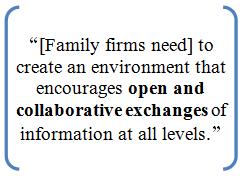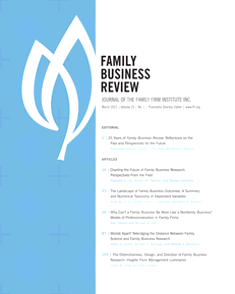Building Trust Between Generations
Editor’s note: We are pleased to welcome Isabella R. Hatak and Dietmar Roessl, both of the WU Vienna University of Economics and Business in Vienna, Austria. Their paper, “Relational Competence-Based Knowledge Transfer Within Intrafamily Succession: An Experimental Study,” is forthcoming in Family Business Review and now available in the journal’s OnlineFirst section.
 Transferring knowledge successfully to successors in the course of intra-family succession can provide the foundation for innovating and improving efficiency, thus taking advantage of the potential value of the predecessor’s knowledge. However, the typical characteristics of family firms, like their small size, informal organization structures, and a restrictive information policy, imply lower pressure and a lower propensity to make contextual information and framed experiences, which are embedded in the main entrepreneur in the majority of cases, explicit. Especially in the course of intra-family succession, which can lead to an agency relationship between predecessor and successor, the main entrepreneur can be reluctant to supply knowledge; due to information asymmetries associated with the delegation of authority it is possible for successors to pursue hidden agendas within the succession process so that the predecessor can be confronted with the elementary question whether the successor has the intention to keep the firm in the family and the family in the firm.
Transferring knowledge successfully to successors in the course of intra-family succession can provide the foundation for innovating and improving efficiency, thus taking advantage of the potential value of the predecessor’s knowledge. However, the typical characteristics of family firms, like their small size, informal organization structures, and a restrictive information policy, imply lower pressure and a lower propensity to make contextual information and framed experiences, which are embedded in the main entrepreneur in the majority of cases, explicit. Especially in the course of intra-family succession, which can lead to an agency relationship between predecessor and successor, the main entrepreneur can be reluctant to supply knowledge; due to information asymmetries associated with the delegation of authority it is possible for successors to pursue hidden agendas within the succession process so that the predecessor can be confronted with the elementary question whether the successor has the intention to keep the firm in the family and the family in the firm.
In this regard, we assume that the perceived relational competence of the successor can absorb the succession-immanent behavioral risks via the dimension “trust” so that the predecessor can accept the uncertainties concerning the other party’s goodwill, which results in an effective knowledge transfer. Whereas the importance of the successor’s technical skills and capabilities as to the continuation of the firm, for example, has been extensively discussed within family firm succession, the study of relational competence as a determinant of an effective knowledge transfer within intra-family succession has largely been ignored.
 Results of our experiment show that the constructs relational competence and knowledge transfer are highly correlated and that this relationship is highly significant. Whereas correlation analysis also revealed that the hypotheses as to the relationship between the predecessor’s trust propensity and risk propensity on the one hand and knowledge transfer on the other hand can be accepted, the relationship between the predecessor’s situational risk perception and knowledge transfer cannot be confirmed. Moreover, subsequent analysis revealed that trust propensity and risk propensity are positively correlated. Against the background that the decision to trust is seen as a risky advance performance, it is comprehensible that a pronounced willingness to trust others goes along with a higher propensity to take risks.
Results of our experiment show that the constructs relational competence and knowledge transfer are highly correlated and that this relationship is highly significant. Whereas correlation analysis also revealed that the hypotheses as to the relationship between the predecessor’s trust propensity and risk propensity on the one hand and knowledge transfer on the other hand can be accepted, the relationship between the predecessor’s situational risk perception and knowledge transfer cannot be confirmed. Moreover, subsequent analysis revealed that trust propensity and risk propensity are positively correlated. Against the background that the decision to trust is seen as a risky advance performance, it is comprehensible that a pronounced willingness to trust others goes along with a higher propensity to take risks.
With regard to the results, particular attention should be paid to methods (workshops, coaching, training sessions) that strengthen the relational competence of the successor. As a trust-based relationship between generations is needed, the successor should demonstrate his or her relational competence by appreciating the predecessor’s knowledge and his or her contribution to the firm, not rejecting tried and tested work methods and practices without having considered their value to the firm. If the knowledge transfer process is completed, the successor has to integrate the predecessor’s knowledge in family and professional contacts with his or her own knowledge to assess and manage the firm’s familiness and to invest in replenishing, increasing, and upgrading these knowledge bases as valuable resources.
To conclude, by identifying and analyzing the key role of relational competence in the knowledge transfer process we tried to meet the requirements stated by Cabrera-Suárez, De Sáa-Perez, & García-Almeida (2001) and Sharma (2004), where the process through which knowledge is transferred within intra-family succession should be further explored, especially by focusing on the characteristics and attitudes of predecessor and successor and the relationship between them. In doing so, the article directs attention to a construct whose relevance the literature has so far underestimated: Relational competence plays a central role as a determinant of trust and knowledge transfer; thus, the development of relational competence must receive appropriate attention in research and entrepreneurial training schemes. After all, it can be assumed that relational competence has a significant influence on facilitating trust and knowledge transfer also in other settings (e.g., relation between family firm owner and bank, between family firm owner and his or her customers).
 Read the paper, “Relational Competence-Based Knowledge Transfer Within Intrafamily Succession: An Experimental Study,” online in Family Business Review.
Read the paper, “Relational Competence-Based Knowledge Transfer Within Intrafamily Succession: An Experimental Study,” online in Family Business Review.
Isabella R. Hatak, MA, MSc, PhD, is Assistant Professor at the Institute for SME Management and Entrepreneurship at the WU Vienna University of Economics and Business. She has published contributions to international conferences and peer-reviewed journals and has received several awards for her res earch on trust, relational competence, and knowledge transfer within family firms.
earch on trust, relational competence, and knowledge transfer within family firms.
Dietmar Roessl, PhD, is Professor and Head of the Institute for SME Management and Entrepreneurship at the WU Vienna University of Economics and Business.






















































































